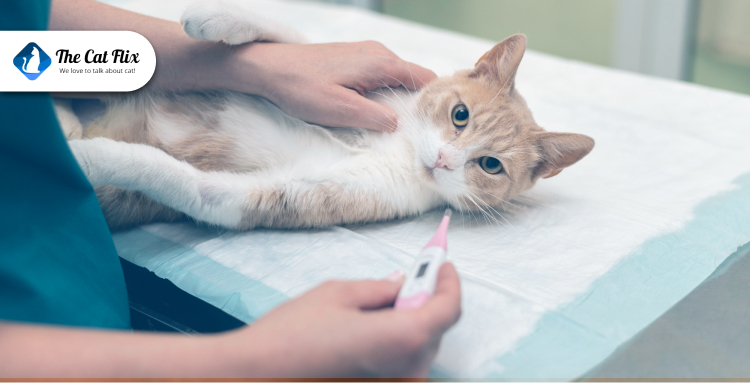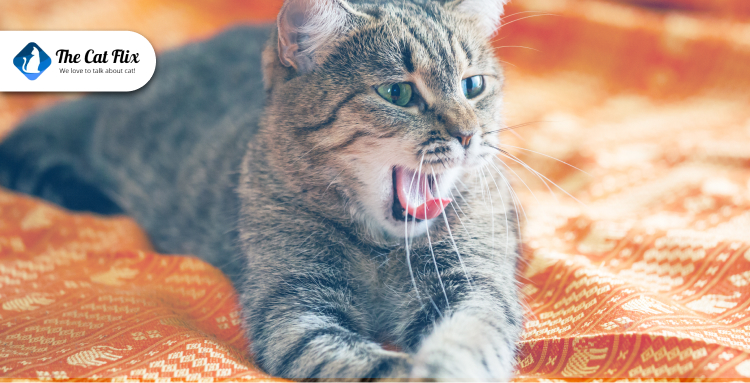You step outside, and the air feels heavy with the scent of blooming flowers, the golden haze of pollen drifting lazily in the breeze. As the world reshapes itself with vibrant colors and fragrant smells, your cats find themselves battling a silent enemy—seasonal allergy. It’s like nature’s beauty turns itself into sneezing fits and endless itch for your cats. Allergy isn’t just a human problem; cats can also fall victim to the cruel effects of environmental allergens like pollen or dust mites. But for us humans, relief comes in the form of antihistamines or a quick trip to the pharmacy. But what about cats?
While your little cat can’t voice their discomfort, their actions often speak louder than words. They depend on you to recognize the allergic signs and provide help. And to help you, Catflix is here again. We’ve come today with some meow-relief to treat your cat’s seasonal allergies. But first, let’s see what the allergic symptoms are and unmask what’s triggering them.
Sniffling and Sneezing: Spotting Seasonal Allergies in Cats
Your cat, usually playful and relaxed, starts scratching non-stop, licking their paws obsessively, or shaking their head like they’re trying to flick off an invisible bug. These could be signs of seasonal allergies sneaking up on them. Cats don’t experience allergies quite like we do. We often battle allergies through sneezing and runny noses. But cats show their discomfort through their skin. Here’s what to look out for seasonal allergic signs:
- Bald patches where fur used to be, especially around the neck, tail, or ears.
- Red, irritated skin that your cat just won’t stop scratching.
- Sudden ear infections or crusty sores from too much scratching.
- Respiratory issues like sneezing or wheezing, though less common.
- Watery eyes or nose, and sometimes even vomiting or extra hairballs.
- A grumpy mood or less energy because they’re uncomfortable.
- If these symptoms sound familiar, it might be time to step in and help your furry friend.
Cats rely on their owner to notice when something feels off. If your cat shows these signs, they may be struggling with seasonal allergies. Catching these symptoms early can help your feline friend feel better fast. But what triggers this pollen-pox in cats?
What are Seasonal Causes of Allergy in Cats?

Seasonal allergies in cats often start with one tiny troublemaker—pollen. Trees, grass, and weeds release it in massive amounts, especially during spring and summer. These microscopic particles float through the air, sneaking onto your cat’s skin, eyes, nose, and ears. When this happens, your cat’s immune system goes into overdrive, releasing histamines that trigger itching, scratching, and other allergy symptoms.
But pollen isn’t the only culprit. Other common seasonal allergens include:
- Mold and mildew: These thrive in damp places and release spores your cat can inhale.
- Dust mites: Found in every home, they can irritate sensitive cats.
- Fleas: Their bites can cause intense itching and even allergic reactions in some cats.
Cats with seasonal allergies react because their immune systems mistake harmless particles for threats. While these allergens are a natural part of the environment, they can turn your cat’s world into an itchy nightmare. So, how can you manage this nightmare?
Relief for Itchy Kitties: Treating Seasonal Allergies in Cats
Seasonal allergies in cats can make life uncomfortable, but there are ways to help. Treatment often requires a combination of steps tailored to your cat’s needs. Here’s how you can bring relief to your itchy kitty:
1. Visit the Vet
Start with a consultation. Your veterinarian will assess your cat’s symptoms, rule out other conditions (like skin infections or parasites), and create a tailored treatment plan.
2. Identify and Avoid Allergens
While pinpointing allergens can be tricky, avoiding known triggers is key.
- Flea Control: Fleas can worsen allergies. Use year-round flea prevention for all pets in your home. Products like Revolution Plus or Comfortis are effective.
- Reduce Environmental Allergens: You can keep windows closed during pollen season and avoid spending time outside even though the outdoors may be tempting. Because pollen counts can be high.
- Minimize Outdoor Exposure: Avoid allowing your cat outside when allergens like pollen are high, especially in the basement or garage
3. Medications for Allergy Relief

Your vet may recommend:
- Antihistamines: Over-the-counter options like Benadryl, Zyrtec, or Chlor-Trimeton can help but must be used under veterinary guidance. Avoid products containing pseudoephedrine, as it is toxic to cats.
- Corticosteroids: These reduce inflammation and itching but should be used short-term due to potential side effects.
- Topical Treatments: Medicated creams or ointments soothe irritated skin.
- Itch-Relief Medications: Prescription options like Atopica (cyclosporine) or injectable therapies may help in severe cases.
4. Immunotherapy (Allergy Shots)
If allergy testing identifies specific triggers, immunotherapy may be a long-term solution. It involves giving your cat small doses of the allergen to build tolerance. This method requires patience, as results take time.
5. Bathing and Grooming
Medicated shampoos can help reduce allergens on the skin and relieve itching. Look for shampoos with antifungal, antibacterial, or anti-inflammatory properties as your vet prescribed. Frequent grooming, particularly brushing and bathing with hypoallergenic shampoo helps remove allergens trapped in your cat’s fur.
6. Address Secondary Infections
Allergies often lead to secondary issues like bacterial or yeast infections. Your vet may prescribe antibiotics, antifungal treatments, or medicated ear flushes if infections occur.
7. Dietary Adjustments
Sometimes, allergies are linked to food sensitivities. A vet may recommend a hypoallergenic or limited-ingredient diet to rule out food-related triggers.
Can Home Remedies Help Cat’s Pollen Allergies?
Home remedies can help with your cat’s pollen allergies, but always check with your vet first. Some remedies might not be safe for cats with specific health issues or those on medication. If your vet approves, here are some easy steps you can try:
- Keep Your Home Clean
Reduce allergens by vacuuming carpets, cleaning furniture, and washing your cat’s bedding often. Using an air purifier with a HEPA filter can also help remove pollen and dust from the air.
- Try Omega-3 Fatty Acids
Omega-3s, found in fish oil, may ease inflammation from allergies. Ask your vet if a supplement or adding it to your cat’s diet is right for them.
- Consider Quercetin
Quercetin, a natural supplement, is known for its antihistamine properties. Sometimes called “nature’s Benadryl,” it can help manage allergy symptoms. Talk to your vet about safe dosages for cats.
- Use Coconut Oil for Skin Relief
Coconut oil can soothe itchy skin. Apply a small amount to irritated areas, but watch to ensure your cat doesn’t lick it off too much.
- Add Probiotics
Probiotics can restore gut bacteria balance and help manage skin allergies. These are available as supplements but check with your vet for cat-safe options.
- Cover Itchy Spots
If your cat keeps scratching certain areas, lightweight pet clothing can reduce irritation and allow the skin to heal.
Frequently Asked Questions

Q. Can cats outgrow seasonal allergies?
Unlike children, cats typically develop stronger allergies over time. They require ongoing management to keep symptoms under control.
Q. Are indoor cats less prone to seasonal allergies?
Indoor cats can still develop allergies to pollen. Because it can enter the home through windows or on your clothes.
Q. Can untreated allergies in cats lead to more severe issues?
Untreated allergies can worsen symptoms, leading to more discomfort and possible health complications. It’s important to address allergy signs early.
Q. How do I know if my cat’s allergies are year-round, not seasonal?
If your cat’s allergy symptoms persist throughout the year, regardless of the season, it’s likely they have year-round allergies. It’s often caused by indoor allergens like dust or mold.
Q. How long do cat seasonal allergies last?
Seasonal allergies can last from a few weeks to several months, depending on the allergen and the time of year.
Q. Is there a cat allergy vaccine?
Yes. HYPOCAT™ is a vaccine designed to reduce the allergens cats produce, making it easier for humans with cat allergies to tolerate them.
Q. Can I use cat allergy spray?
Yes, you can. Pet allergy sprays can reduce airborne allergens and help manage symptoms in allergic individuals.
Q. Which time of year worsens allergy in cats?
Allergies can worsen depending on the season and allergen type. Pollen allergies peak in spring, summer, or fall, while indoor allergens like dust mites may be worse in winter.
Say Goodbye to Seasonal Cat Allergy
Helping your cat feel better during allergy season doesn’t have to be stressful. With guidance from your vet and simple changes at home, you can ease their discomfort and keep them happy. Regular cleaning, diet adjustments, and safe home remedies can make a big difference.
Got questions or tips to share? Leave them in the comments! If you found this helpful, share it with fellow cat parents who might need it too. Let’s keep our furry friends comfortable all year long.

